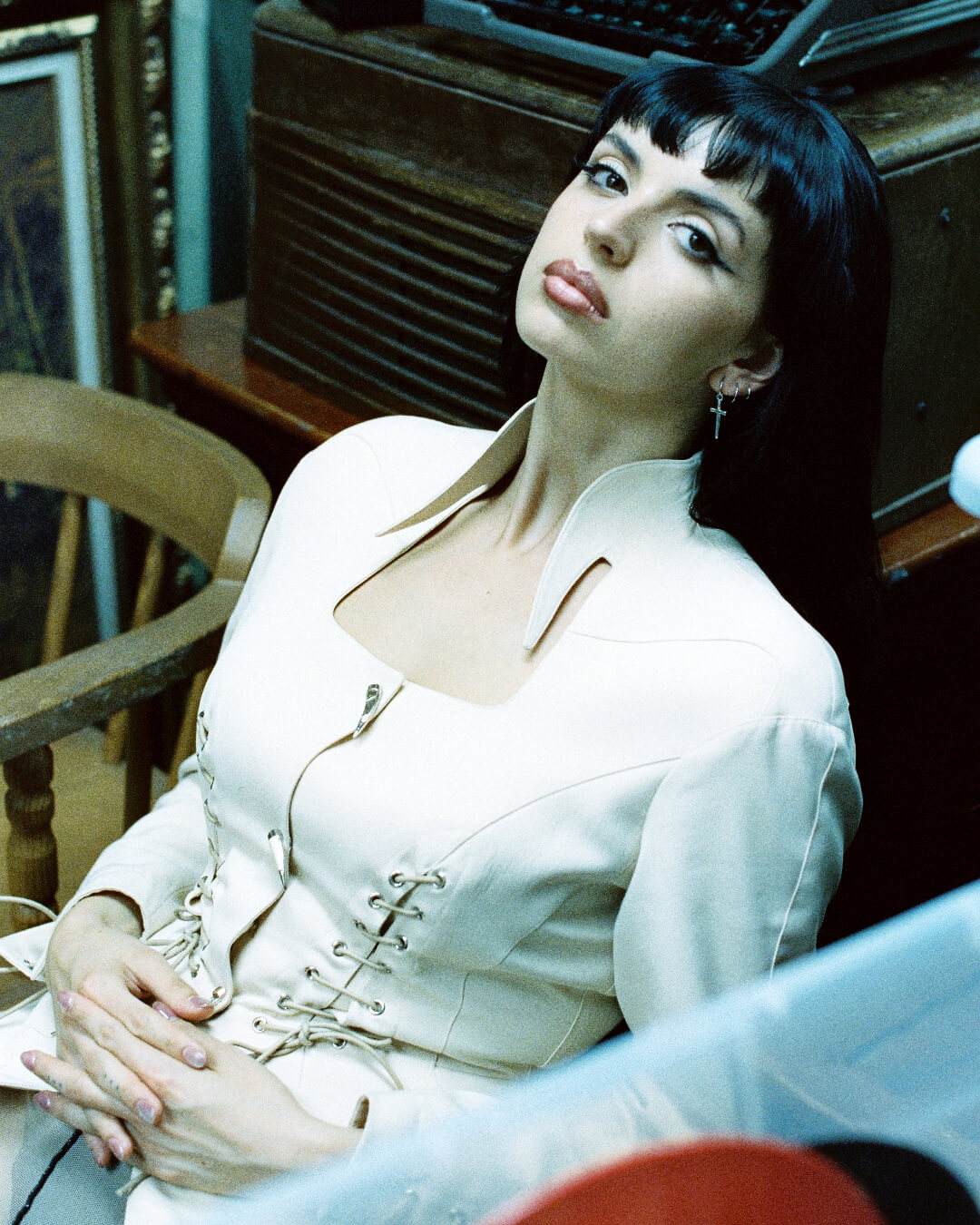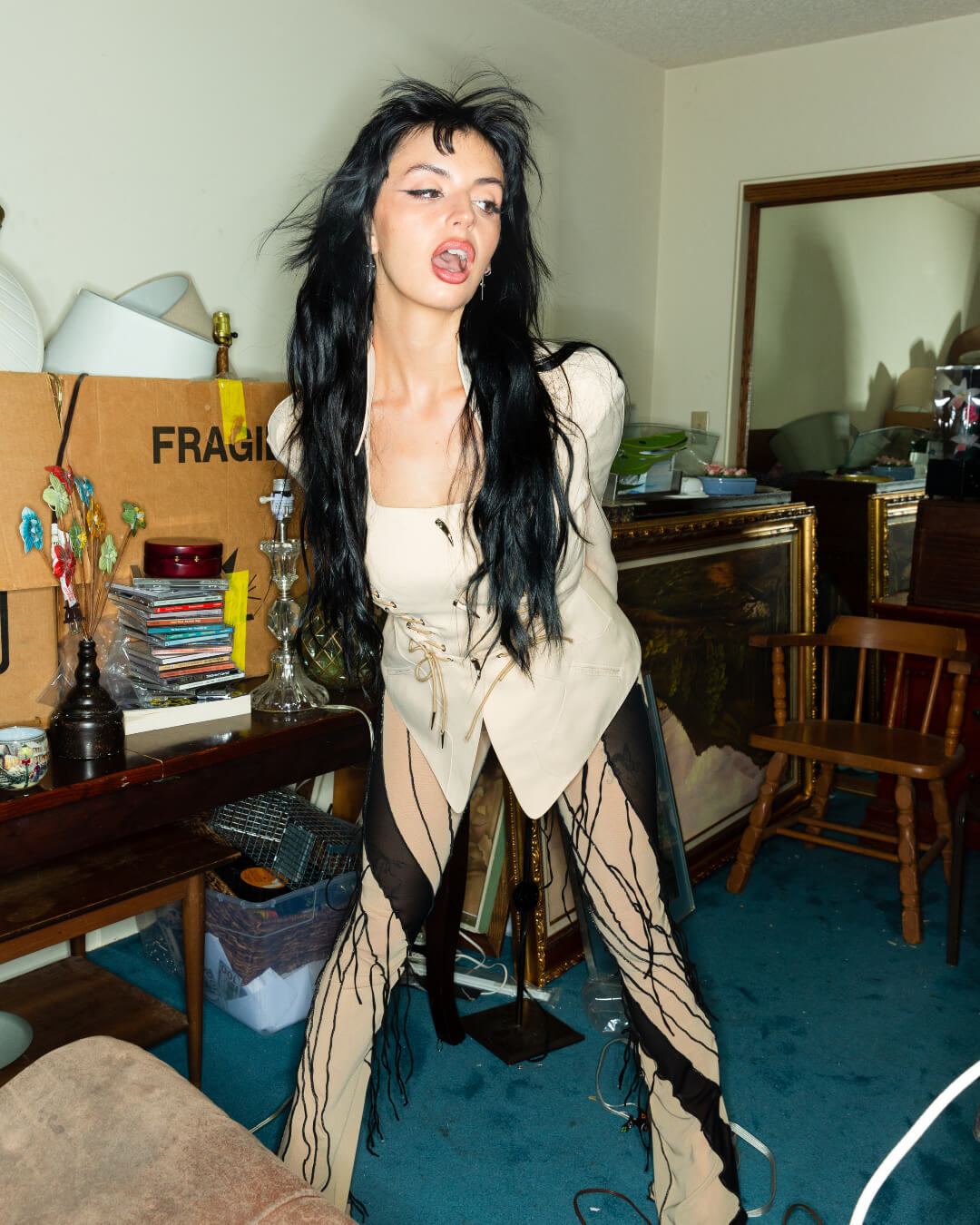By Stephan Boissonneault
With There Is Nothing In The Dark That Isn’t There In The Light, the veteran vocalist leans into intimate, searching folk.
The song was “Friday,” a song celebrating weekend festivities written haphazardly by now-defunct ARK Music Factory founder Patrice Wilson in the early hours of a 2011 Friday morning. It was slathered in Auto-Tune and handed off to an unsuspecting 13-year-old, who woke up a month and a half later to both a song charting on Billboard and, unfortunately, an inbox full of death threats after the video racked up the dislikes on YouTube, many dubbing it the worst song of all time.
But people had the song on repeat for a reason – behind all of it, there was a going-out melody catchy enough to be resonating years later and a certain degree of star power. It’s no wonder that 12 years later, Black is still scoring viral moments on social media and linking up with the hyperpop community – she even released a pitched-up remix celebrating the tenth anniversary of “Friday” with Dorian Electra, Big Freedia, 3Oh!3, and Dylan Brady of 100 gecs. Black simply had to embrace the meme and wait for the cyclical nature of trends to come back around to claim her as a misunderstood hero.

With the digitized vocals and semi-ironic sharing of what became a must-see clip, you could easily look to “Friday” as a prognosticator of the kind of songs that blow up on TikTok, or even a hyperpop track years ahead of the game – Black still reels over PC Music founder A.G. Cook, telling her personally that the song and its surrounding phenomenon was a big inspiration for his sound and outlook in his early days.
“Everyone’s always looking to be ahead of the step of where the masses are – we see that in fashion, in music, in memes, there’s always somebody that once something is deemed ‘cool,’ it’s uncool,” Black says. “Another piece of that that’s separate is when something that was rejected becomes celebrated again. There’s this reckoning with this younger part of yourself. People not only like cringing at that time on the Internet, but you cringe at who you were. You know it exists somewhere deep in a Facebook album.”
Along with the song itself, another thing that people are re-evaluating is just how damaging hurtful comments online can be to a developing mind. Just take a look at the online furor raised recently when the 2023 Razzie Awards nominated 12-year-old Ryan Kiera Armstrong, star of the Firestarter reboot, for “Worst Actress,” as the masses caused them to rescind the nomination and apologize. In 2011, it might have been a lot more of a big joke. While Black did release a handful of singles over the decade that followed, the comments were hard to forget every time she stepped onto a stage.
“I don’t think I ever lost my drive for music, but I definitely had huge moments of insecurity, internal struggle and figuring out who I was,” she says. “We can’t keep holding kids to these insane expectations that we have of them as artists – day after day, some random kid goes viral on TikTok and gets absolutely torn apart, and for what? I’d be lying if I said I didn’t struggle a little bit with it even now. But I think it was just a lot of therapy and a lot of work I did on myself that really helped me.”


As she prepares to release her debut album, Let Her Burn, Black has had many years to reckon with her identity, and her new music often lyrically reflects that struggle while also sharing uplifting messages about discovering her inner power and committing to displaying all sides of herself. It’s her second project since coming out as a member of the LGBTQ2+ community in 2020, following 2021’s Rebecca Black Was Here EP that started her journey towards the quicker tempos, synth cascades and freeform insanity of hyperpop. Her latest pushes those boundaries even further, with a handful of distortion, skittering breakbeats and some extravagant, delightfully campy dancefloor anthems.
“There are so many beautiful pieces of culture that the queer community harnesses way before the rest of the world does,” Black says. “Queer people don’t see themselves in many forms of art, and the ones that they have, camp has been a huge piece of that. Pop would be nothing without its insanity, and I think that’s missing in a lot of the biggest pop artists today. They’re afraid to be what pop should be, and what makes it so special and psychotic and interesting. To see somebody truly learn how to realize their deepest hopes and dreams or darkest fears or fantasies, gay people understand it and latch onto it.”
While tracks like “Destroy Me” and “Misery Loves Company” take things to a darker place than we might expect from Black when it comes to discussing her relationships and the difficulty she has with accepting love and compliments, we also get to see Black’s more fun-loving side come out on tracks like “Doe Eyed,” a sexually-charged and bubbly pop anthem.
“I wrote that song with Oscar Scheller, who is the guy behind ‘STUPID’ by Ashnikko, and a lot of Shygirl stuff. I forget which one of us came up with ‘bibbidi bobbidi boop, oui merci beaucoup,” but it felt like if we didn’t take it as far as we could, then what was the point?” she says. “As somebody who’s really struggled with feelings of legitimacy, I had to be able to find as much legitimacy in a song like that as I could, and know that as a creative person, that’s okay.”

Black has spoken about how the album’s overriding theme is how performance has always altered her perception of self, in ways that she doesn’t necessarily want. It has a bit of a double meaning: Black is obviously known for stepping into an exaggerated, pop-princess version of herself every time she performs on stage, but she’s also talking about being performative in her day-to-day life. The closing track “Performer” discusses her putting up fronts to fit in, and how being known as a performer first and foremost makes it her default mode, even off-stage. This can get in the way of making genuine connections.
“It’s the biggest thing that I struggle with, and the song is about watching me have the same issues that other people in my family have had. All I’m trying to do is get to a better, more connected place,” she says. “A lot of times we have all of these different versions of ourselves that we know are like half true, but maybe they’re actually all true. They’re just different kinds of versions that we get to see at different points. And I think that that’s kind of what this album is, is learning how to accept and reason with all of them. I’ve found a lot of confidence, but I haven’t gotten all the way there.”
Still, it’s been an impressive journey, and at just 25 years old, it’s far from over. Of course, many of us remember the 13-year-old Black’s daily activities all too well, from waking up at 7 a.m. to an agonizing decision over which car seat to take – but after coming so far, what does Black’s typical Friday look like these days?
“I wake up probably around 9, I take my dog out, and make breakfast for me and my girlfriend – no, my girlfriend makes breakfast for me. And then I get to work!”
By Stephan Boissonneault
With There Is Nothing In The Dark That Isn’t There In The Light, the veteran vocalist leans into intimate, searching folk.
By Sam Hendriks
A refined turn toward clarity reveals Melody Prochet at her most grounded and assured.
By Judynn Valcin
Inside the Montréal musician’s shift toward ease, openness, and a sound that refuses to collapse even as it teeters.